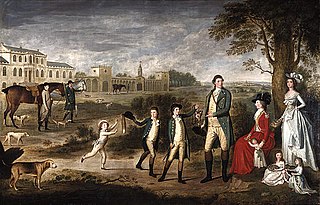Related Research Articles

Earl of Kintore is a title in the Peerage of Scotland. It was created in 1677 for Sir John Keith, third son of William Keith, 6th Hereditary Earl Marischal of Scotland and Chief of Clan Keith. He was made Lord Keith of Inverurie and Keith Hall at the same time, also in the Peerage of Scotland. At the death of William, the 4th Earl, in 1761, the Earldom and Lordship became dormant, as no-one could prove a claim to them. In 1778, it was decided that the Earldom, Lordship and Chieftaincy of Clan should pass to Anthony Adrian Falconer, Lord Falconer of Halkerton, who changed his surname to Keith-Falconer. The Lordship Falconer of Halkerton and the Earldom of Kintore and Lordship Keith of Inverurie and Keith Hall remained united until 1966, when, at the death of the 10th Earl, the Lordship Falconer of Halkerton became dormant.

There have been five baronetcies of the United Kingdom created for a person with the surname Erskine, two in the Baronetage of Nova Scotia, one in the Baronetage of Great Britain and two in the Baronetage of the United Kingdom. Two of the creations are extant as of 2010.

George Ogilvy, 2nd Lord Banff was member of the old Scottish Parliament, a feudal baron, and a Cavalier.
Sir David Falconer of Newton was a Scottish judge.
Alexander Falconer may refer to:
Sir Alexander Falconer, 1st Lord Falconer of Halkerton (1595–1671), was a Scottish judge.
Sir Alexander Ogilvy, 1st Baronet was a Scottish politician and judge, lord of session under the title Lord Forglen.
Herbert Mackworth was a Welsh landowner, coal owner and Tory politician who sat in the House of Commons from 1739 to 1765.
Events from the year 1595 in the Kingdom of Scotland.
George Ogilvy, recorded as baptised in the Aberdeen sasines, xiv 500, on 9 September 1649, was the third Lord Banff. He inherited the lands of Inchdrewer and Montbray on the death of his father in 1668. Formerly a staunch Roman Catholic, he renounced his faith and became a Protestant in 1705, which allowed him to resume his seat in the Scottish Parliament in 1706. On the final sitting of the parliament, he voted in support of the Acts of Union 1707 and received a nominal payment as his share of the compensation fund. He was murdered and his body burned in a fire at Inchdrewer Castle in 1713.
David Falconer, 4th Lord of Halkerton was an English aristocrat in Scotland. He held the title from 1724 to 1751
William Falconer, 6th Lord of Halkerton was an English aristocrat who was Lord Falconer of Halkerton from 1762 until his death in 1776.
Events from the year 1684 in the Kingdom of Scotland.
Patrick Gray, 5th Lord Gray, was a Scottish landowner

Francis Alexander Keith-Falconer, 8th Earl of Kintore, 10th Lord Falconer of Halkerton, 8th Lord Keith of Inverurie and Keith Hall, Chief of Clan Keith, was a Scottish aristocrat.
Anthony Keith-Falconer, 7th Earl of Kintore, 9th Lord Falconer of Halkerton, 7th Lord Keith of Inverurie and Keith Hall, Chief of Clan Keith, was a Scottish aristocrat.
William Keith, 2nd Earl of Kintore, was a Scottish nobleman.
Anthony Adrian Keith-Falconer, 5th Earl of Kintore, 5th Lord Keith of Inverurie and Keith Hall, who was known as the 7th Lord Falconer of Halkerton, between 1776 and 1778, was a Dutch-Scottish aristocrat.

William Keith-Falconer, 6th Earl of Kintore, 8th Lord Falconer of Halkerton, 6th Lord Keith of Inverurie and Keith Hall, was a Dutch-Scottish aristocrat.
David Carnegie of Colluthie (1559-1598) was a Scottish landowner and administrator.
References
- ↑ Beatson, Robert (1788). A Political Index to the Histories of Great Britain and Ireland. p. 54.
- ↑ Anderson, William (1863). The Scottish Nation, Or, The Surnames, Families, Literature, Honours, and Biographical History of the People of Scotland. p. 188.
- ↑ Fraser, William Ruxton (1880). History of the parish and burgh of Laurencekirk. p. 42.